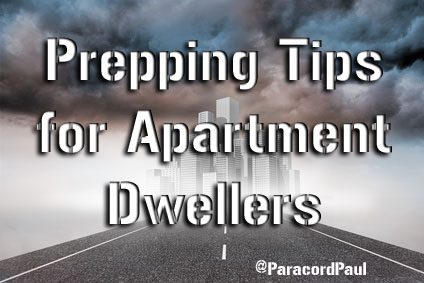Disaster Prepping Tips for the Apartment Dweller
[If you don’t live in a big city or apartment — forward this article to someone you know who does and give them a hand-up in getting prepared for whatever lies ahead! ]

Okay, not everyone gets to live out in the country as we do. So it would make sense for urban people to think of preparedness differently.
Most people in big cities live in apartments and condos vs. single-family homes on a chunk of land, providing more control and room with less exposure to others.
Nowadays, many folks have no choice but to live in multi-family dwellings – duplexes, complexes, and high-rise apartment buildings. Then some live in big cities because they prefer that lifestyle. And, good for them — that’s what America is all about! Living where you want — and, like us, having the freedom to pick up and “get out of Dodge” like we did when we left Chicago a decade ago!
Living in an urban environment is a severe concern for anyone with a true prepper’s heart. Being surrounded by crowds of strangers in the face of a natural disaster is a secondary nightmare in and of itself. For this reason alone, those living in that environment should be even more interested in prepping.
Here are some prepping tips to give you a fighting chance when disaster strikes. These are actionable tips you can get working on today!
Put together a Bug-out Bag.
First things first — a Basic Bug-out Bag Could Save Your Life! This is an article I wrote about putting together your first Bug-out Bag.
Keep your ear to the ground.
Living in an apartment, especially in a highly populated area, is even more vital to know what is happening around you. When responding to many types of disasters, your available reaction time is significantly shorter than that of a prepper who lives in an isolated area.
You should have a solar-chargeable weather radio (Judi has the NOAH weather app on her phone and an actual radio for backup on our bedstand and highly recommends it!), a transistor radio, and a good-quality cell phone with a solar charger. Meet with all concerned and write down your communication action list in order of priority, discussing everything in detail. Establishing your plan should include communicating with family members who aren’t home when disaster strikes.
In addition to availing yourself of the best communication supports you can afford, both low and high-tech, you should work at building a network of like-minded individuals who can be trusted to work with you when things are going south. Contact your direct neighbors on your floor and coordinate a get-together to get some basics in place.
Consider disaster planning at your next meeting if your building, block, or neighborhood has an association. Suppose there is no such organized group—spearhead one. If you’re uncomfortable connecting with strangers, search for a local prepper network, church, or community organization, which are often great places to meet folks who believe in being prepared.
Have multiple evac plans.
Leaving a highly populated area in a disaster can be very daunting. Fortunately, it is a rare disaster that justifies altogether leaving the area. You should have a plan for a nearby place where you can get away from the crowd – perhaps at a home of a relative or close friend.
Talk with them about what situations may arise and if you can count on them. Offering to keep extra supplies at their location in case you need to rely on them helps reduce their cost concerns as an objection.
This is particularly useful if this person can be trusted with storing some of your emergency supplies and food. However, on the off-chance that you must evacuate the area thoroughly, you should already know where you’re going and how to get there.
Research the area in advance to know what resources are available, where you can get gas, water, and supplies between your apartment and your destination, and, if possible, know people you can trust along the route. Do a practice run on a weekend and stop in the establishments you would want to utilize if the time comes.
Be friendly, introduce yourself, and chit-chat — this will help you be remembered in a positive light if times get hectic. Creating a “Plan B” is recommended, since disasters, by nature, can make it hard to predict the continued safety of your primary destination.
Get in shape.
Your physical health is the most important resource you can have in an emergency in an urban environment. In large cities, evacuation routes are more likely to be blocked.
When your vehicle is no longer an option, you will need serious stamina to walk out of the city while carrying your bug-out bag and being prepared to defend yourself. Regular aerobic exercise, maintaining a healthy weight, and incorporating strength training into your daily routine will help you feel physically better and improve your mental well-being and sense of security. Taking care of yourself is critical to being prepared.
There aren’t many advantages to living in an apartment when disaster strikes. But you don’t have to throw in the towel if you do. I have many preparedness articles for you to read here at your convenience.
If you are well-informed and supplied, have a plan in place, and are prepared to carry it out, you have a fighting chance of getting through whatever comes your way!
